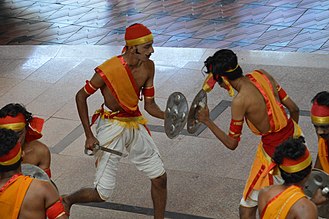Parichamuttukali

Parichamuttu Kali ([Malayalam]: പരിചമുട്ട്കളി ) is an Indian martial-arts dance form of Kerala practiced by the Saint Thomas Syrian Christians who trace their origins to the evangelistic activity of Thomas the Apostle in the 1st century.[1][2] It is performed by men bearing swords and shields and follows the movements and steps of Kalarippayattu.
| Part of a series on |
| Saint Thomas Christians |
|---|
 |
| History |
|
| Religion |
| Prominent persons |
|
| Culture |
History[]
The origin of the art can be traced back to ancient days when Kalarippayattu, a martial art of Kerala, was in vogue.[3]
Performance[]
The dancers are usually dressed in a white loin cloth with red wrist bands and sing in chorus as they dance. The performers dance with sword and shield on their hands. The group is usually headed by a leader called Asan around whom the rest of the dancers perform.[4] The dance used to be performed as a religious offering but is nowadays gaining popularity as a Syrian Christian entertainment art.
Current situation[]
Currently both Parichamuttukali and Margamkali are included in the State Youth Festival of Kerala. This makes these art forms a competitive item in the Four-tier system (i.e. School, Sub District, Revenue and State level) Youth festival.[2]
See also[]
References[]
- ^ "Parichamuttukali". Kerala Tourism.
- ^ a b "Margam Kali – History, Text, Lyrics, Theme, Early Reference and Modern Developments". 4 May 2009.
- ^ "Archived copy". Archived from the original on 27 August 2014. Retrieved 31 October 2014.
{{cite web}}: CS1 maint: archived copy as title (link) - ^ "Archived copy". Archived from the original on 31 October 2014. Retrieved 31 October 2014.
{{cite web}}: CS1 maint: archived copy as title (link)
- Dances of India
- Arts of Kerala